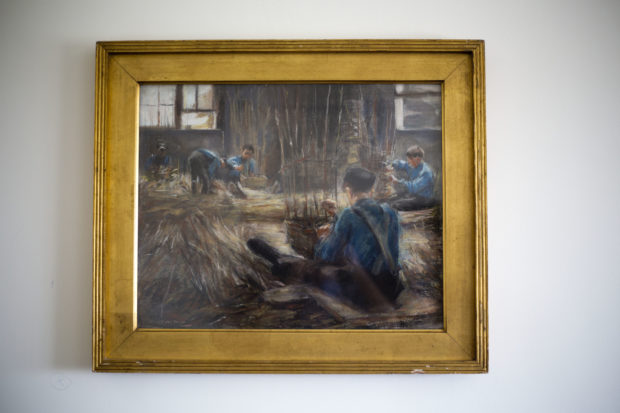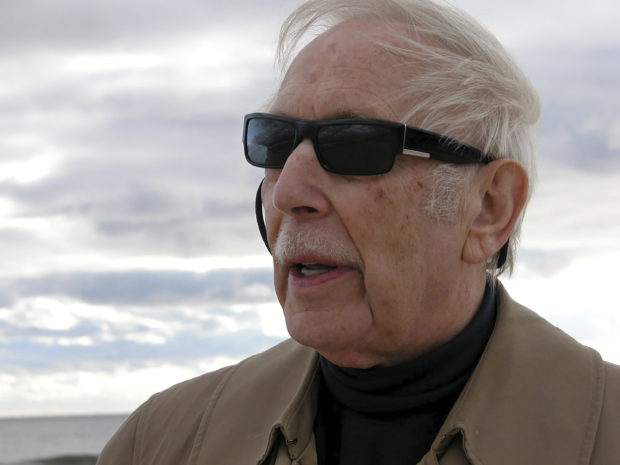Lives Lost: Holocaust survivor reclaimed Nazi-looted artwork

In this file photo taken on April 5, 2017, Meir Heller, the Jerusalem lawyer whose client then insisted on maintaining his anonymity holds Max Liebermann’s “Basket Weavers” painting in a law office in Jerusalem. The painting was returned to David Toren, an American heir of its original Jewish owner, after he sued the government of Germany for his great-uncle’s collection and after a lengthy saga, recovered artworks confiscated by the Nazis, jockeyed by an unscrupulous German art trader and ultimately purchased by an Israeli Holocaust survivor unaware of its murky past. Toren died on April 19 in his Manhattan home from symptoms of the coronavirus. He was 94. He left behind his son Peter and two grandchildren. (AP Photo/Ariel Schalit, File)
TEL AVIV, Israel — With the Nazis murdering Jews and ransacking their property outside on the infamous nights of Kristallnacht in 1938, 13-year-old David Toren sat in the sunroom of his wealthy great-uncle in Germany admiring a favorite painting depicting two men on horseback on a beach.
Within a year, Toren would be smuggled out in one of the final Kindertransports, a series of rescues for Jewish children organized by several European countries. Left behind, his family would perish in the death camps and their vast art collection would be seized by Nazis and later traded by unscrupulous dealers.

In this file photo taken on April 5, 2017, Max Liebermann’s “Basket Weavers” painting hangs in a law office in Jerusalem. The painting was returned to David Toren, an American heir of its original Jewish owner, after he sued the government of Germany for his great-uncle’s collection and after a lengthy saga, recovered artworks confiscated by the Nazis, jockeyed by an unscrupulous German art trader and ultimately purchased by an Israeli Holocaust survivor unaware of its murky past. Toren died on April 19 in his Manhattan home from symptoms of the coronavirus. He was 94. He left behind his son Peter and two grandchildren. (AP Photo/Ariel Schalit, File)
Toren would serve in the Israeli pre-state militia before moving to America with less than $100 to his name. He went on to build a successful law practice with an office on the 54th floor of the World Trade Center. Many of the early-life possessions he kept there were destroyed in the 9/11 attacks, carried out before he arrived to work that day.
But even as a degenerative eye condition robbed him of his sight later in life, the images of his past never escaped him, and he embarked on a quest to reclaim some of what was lost. He sued the government of Germany for his great-uncle’s collection and in 2015, after a lengthy saga, recovered the Max Liebermann work “Two Riders on the Beach” that so moved him in his youth.

This undated family photo shows David Toren, who died on April 19, 2020, in his Manhattan home from symptoms of the coronavirus at the age of 94. He escaped Germany on the eve of World War II before his family perished, served in the Israeli pre-state militia, and then built a successful law practice in New York City, narrowly escaping the 9/11 attacks. Only later in life, did David Toren seek to restore some of what was lost in his youth, suing the German government and getting a small measure of justice by reclaiming some of his family’s valuable artwork that was seized by the Nazis. (Peter Toren via AP)
“He regarded it as justice and felt very strongly about it,” said his son, Peter Toren. “The art is something that was taken from his family and it was something there was a possibility of getting back. He couldn’t get back all the lives that were exterminated.”
Toren died on April 19 in his Manhattan home from symptoms of the novel coronavirus or SARS-CoV-2, which causes severe respiratory illness COVID-19. He was 94. He left behind his son Peter and two grandchildren.
For more news about the novel coronavirus click here.
What you need to know about Coronavirus.
For more information on COVID-19, call the DOH Hotline: (02) 86517800 local 1149/1150.
The Inquirer Foundation supports our healthcare frontliners and is still accepting cash donations to be deposited at Banco de Oro (BDO) current account #007960018860 or donate through PayMaya using this link.